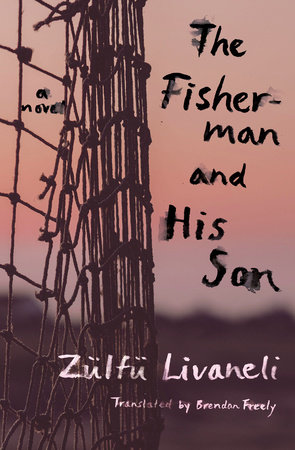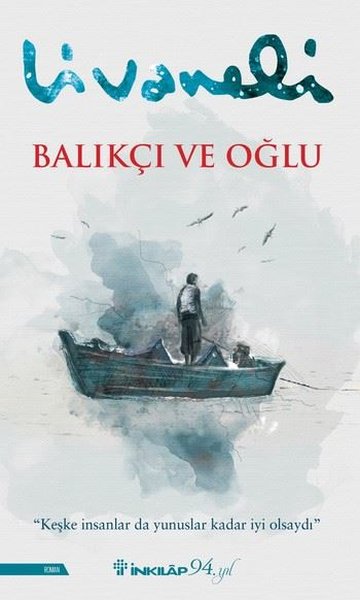
The Fisherman and His Son (2021)
Fisherman and Son tells about the most painful and great drama of recent years, “immigration” through fishermen Mustafa, Mesude and baby Samir. The marriage of Mustafa and Mesude, who was familiar with dead human bodies from the news they watched on TV in their warm home, gets complicated with a half-dead baby they found in the sea.
Fisherman and Son tells about the Aegean’s history and today, about fish farms and the ecological destruction caused by companies attacking the mountains and coasts with the greed of profit. Beyond that, it focuses on immigrants’ journey towards the unknown and their efforts to survive or die. This book by Livaneli is a contemporary epope on family, love, parenting, children, women’s solidarity, friendship, migration, and nature.
By Otherpress:
In this humane, affecting tale of a Turkish couple who lose their child and find another, the internationally bestselling author of Disquiet explores the ethical questions surrounding immigration.
Fisherman Mustafa and his wife, Mesude, are devastated with grief for their son Deniz, who was lost at sea at seven years old. One day, Mustafa discovers the bodies of a woman and man in the water, likely refugees from Syria, Pakistan, or Afghanistan drowned as they attempted to reach Greece. Nearby, he also finds a baby boy, tied to a small inflatable boat and miraculously alive. Mustafa and Mesude at first welcome the child as a precious gift, a second Deniz, but when a woman appears, claiming to be his mother, they must make a painful decision.
Through their heart-wrenching story, Zülfü Livaneli sensitively evokes the struggles of migrants seeking a safer life in unknown, often hostile lands. In the process, he elucidates the history and culture of the Aegean, and the ecological destruction wreaked by corporations in the region
The Fisherman and His Son has been published in Greek in 2023 by Patakis


| A NOTE FROM THE PUBLISHER IN USA (OTHER PRESS) Dear Reader, As a child, Zülfü Livaneli was so obsessed with books that he read all night under his covers while skipping his homework and driving his parents mad. Because The Old Man and the Sea was his favorite, he decided to run away from home and become a fisherman on the Aegean Sea. Eventually he felt guilty for having abandoned his parents, who were sick with worry, and he went back, graduated from school, and became one of Turkey’s most cherished authors and musicians. But his love for Hemingway never left him, even though in my view he is more in tune with some facets of the heart than his mentor! Read this excerpt from Zülfü’s latest novel, The Fisherman and His Son, for example: Mustafa loved dolphins like brothers. He thought they understood he was a friend. Sometimes, when he was bringing tourists around, the dolphins would swim close to the boat, jumping and frolicking, and everyone would admire them. Then the tourists would give bigger tips, especially if they were able to get a photograph. One day a curious tourist showed him a book and asked him if he’d read it. He laughed bitterly. “When do I have time for books, I barely make ends meet,” he said, looking at the book as if it were a strange object. But the tourist insisted. “This book is about a fisherman like you. It’s a novel by an American writer. Are there swordfish around here, do you fish for them?” “Of course,” said Mustafa, “I fish for whatever there is, whatever God ordains.” “Look,” said the tourist, “the fisherman in the novel isn’t young like you, he’s an old man. One day he catches a huge swordfish with a lure, and he starts trying to pull it into his boat. You see, the fish is so big he has to struggle for days and nights—the old man’s hands are covered in blisters and wounds. He’s hungry, but he keeps going. Finally the fish gets tired, and he kills it with a spear. The fish is too big to get into the boat, so he ties it to the side with a rope. Then he heads back, but what do you think happens on the way?” Irritably, Mustafa said, “The man wasn’t a good fisherman. I don’t like him.” The tourist was surprised, but he continued. “Listen, we’re just getting to the exciting part, on the way back, sharks begin eating that huge fish . . .” Mustafa interrupted him. “Forget it, sir, forget it. I don’t like the man, this story isn’t for me, he wasn’t a good fisherman.” The tourist realized he wasn’t going to get through to Mustafa, but it did occur to him to ask why he didn’t like the old fisherman. “If that fish was so wonderful, if it struggled for its life for days, he should have cut the line and said, Go, my lion, you deserve to live, may the sea bless you. Sometimes you catch a huge fish, sir, you come eye to eye with it as you pull it into the boat, and it looks at you so pitifully you can’t bear to kill it, so you throw it back into the sea.” Zülfü is a humanist, caring for his people and for the millions of immigrants who have taken refuge in his land. There isn’t a day when migrants aren’t rescued while either swimming or holding on to rickety boats. Many of course are found dead, floating in the water. The latest refugee boat disaster happened just last week . . . This is the background for The Fisherman and His Son! Zülfü is a fantastic storyteller who knows how to turn the reality on the ground into a plot where characters are able to touch you deeply, even if their worlds seem so far away. All his books have in common that you never forget them—I think this is because Zülfü’s empathy is always at his fingertips. This is the poignant Aegean folk song that our protagonist Mustafa listens to on his boat, “Deniz Üstü Köpürür,” by Cem Karaca. And here is “Ege,” Zülfü’s own beautiful creation on the same theme, and the photos he picked to give you a nearly complete sense of the place. Taste and smell are the only senses missing! Sincerely, Judith Gurewich Publisher Other Press |